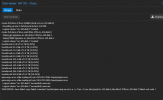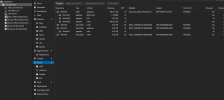I think Disk-4TB is your sdb device and Disk2-4TB is your sdd but lets get some more information about your system
Can you give me the output of
Code:
cat /etc/pve/storage.cfg
lsblk
findmnt
dir: local
path /var/lib/vz
content vztmpl,iso,backup
lvmthin: local-lvm
thinpool data
vgname pve
content rootdir,images
lvm: Disc2-4TB
vgname Disc2-4TB
content images,rootdir
nodes srv1proxmox
shared 0
lvm: Disc-4TB
vgname pool
content rootdir,images
shared 0
dir: Disc3-4TB
path /mnt/pve/Disc3-4TB
content snippets,backup
is_mountpoint 1
nodes srv1proxmox
shared 0
root@srv1proxmox:~# lsblk
NAME MAJ:MIN RM SIZE RO TYPE MOUNTPOINT
sda 8:0 0 465.8G 0 disk
├─sda1 8:1 0 1007K 0 part
├─sda2 8:2 0 1G 0 part /boot/efi
└─sda3 8:3 0 464.8G 0 part
├─pve-swap 253:0 0 8G 0 lvm [SWAP]
├─pve-root 253:1 0 96G 0 lvm /
├─pve-data_tmeta 253:2 0 3.4G 0 lvm
│ └─pve-data-tpool 253:7 0 337.9G 0 lvm
│ ├─pve-data 253:8 0 337.9G 1 lvm
│ ├─pve-vm--102--disk--0 253:9 0 5G 0 lvm
│ ├─pve-vm--103--disk--0 253:10 0 4M 0 lvm
│ └─pve-vm--103--disk--1 253:11 0 4M 0 lvm
└─pve-data_tdata 253:3 0 337.9G 0 lvm
└─pve-data-tpool 253:7 0 337.9G 0 lvm
├─pve-data 253:8 0 337.9G 1 lvm
├─pve-vm--102--disk--0 253:9 0 5G 0 lvm
├─pve-vm--103--disk--0 253:10 0 4M 0 lvm
└─pve-vm--103--disk--1 253:11 0 4M 0 lvm
sdb 8:16 0 3.6T 0 disk
├─pool-pool 253:5 0 15.8G 0 lvm
└─pool-vm--103--disk--0 253:6 0 2T 0 lvm
sdc 8:32 0 3.6T 0 disk
└─sdc1 8:33 0 3.6T 0 part /mnt/pve/Disc3-4TB
sdd 8:48 0 3.6T 0 disk
root@srv1proxmox:~# findmnt
TARGET SOURCE FSTYPE OPTIONS
/ /dev/mapper/pve-root
│ ext4 rw,relatime,errors=remount-ro
├─/sys sysfs sysfs rw,nosuid,nodev,noexec,relatime
│ ├─/sys/kernel/security securityfs securityfs rw,nosuid,nodev,noexec,relatime
│ ├─/sys/fs/cgroup cgroup2 cgroup2 rw,nosuid,nodev,noexec,relatime
│ ├─/sys/fs/pstore pstore pstore rw,nosuid,nodev,noexec,relatime
│ ├─/sys/firmware/efi/efivars efivarfs efivarfs rw,nosuid,nodev,noexec,relatime
│ ├─/sys/fs/bpf bpf bpf rw,nosuid,nodev,noexec,relatime,mode=700
│ ├─/sys/kernel/debug debugfs debugfs rw,nosuid,nodev,noexec,relatime
│ ├─/sys/kernel/tracing tracefs tracefs rw,nosuid,nodev,noexec,relatime
│ ├─/sys/fs/fuse/connections fusectl fusectl rw,nosuid,nodev,noexec,relatime
│ └─/sys/kernel/config configfs configfs rw,nosuid,nodev,noexec,relatime
├─/proc proc proc rw,relatime
│ └─/proc/sys/fs/binfmt_misc systemd-1 autofs rw,relatime,fd=30,pgrp=1,timeout=0,minproto=5,maxproto=5,direct,pipe_ino=18175
├─/dev udev devtmpfs rw,nosuid,relatime,size=16240924k,nr_inodes=4060231,mode=755,inode64
│ ├─/dev/pts devpts devpts rw,nosuid,noexec,relatime,gid=5,mode=620,ptmxmode=000
│ ├─/dev/shm tmpfs tmpfs rw,nosuid,nodev,inode64
│ ├─/dev/mqueue mqueue mqueue rw,nosuid,nodev,noexec,relatime
│ └─/dev/hugepages hugetlbfs hugetlbfs rw,relatime,pagesize=2M
├─/run tmpfs tmpfs rw,nosuid,nodev,noexec,relatime,size=3255132k,mode=755,inode64
│ ├─/run/lock tmpfs tmpfs rw,nosuid,nodev,noexec,relatime,size=5120k,inode64
│ ├─/run/rpc_pipefs sunrpc rpc_pipefs rw,relatime
│ └─/run/user/0 tmpfs tmpfs rw,nosuid,nodev,relatime,size=3255128k,nr_inodes=813782,mode=700,inode64
├─/boot/efi /dev/sda2 vfat rw,relatime,fmask=0022,dmask=0022,codepage=437,iocharset=iso8859-1,shortname=mixed,e
├─/mnt/pve/Disc3-4TB /dev/sdc1 ext4 rw,relatime
├─/var/lib/lxcfs lxcfs fuse.lxcfs rw,nosuid,nodev,relatime,user_id=0,group_id=0,allow_other
└─/etc/pve /dev/fuse fuse rw,nosuid,nodev,relatime,user_id=0,group_id=0,default_permissions,allow_other













